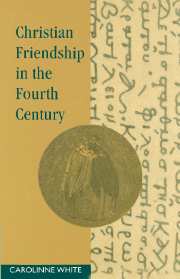Book contents
- Frontmatter
- Contents
- Preface
- Abbreviations
- 1 Introduction
- 2 Classical theories of friendship
- 3 Some problems of Christian friendship
- 4 Friendship in the lives and thought of Basil and of Gregory of Nazianzus
- 5 John Chrysostom and Olympias
- 6 Synesius of Cyrene
- 7 Ambrose of Milan – Ciceronian or Christian friendship?
- 8 St Jerome
- 9 Paulinus of Nola
- 10 Monasticism and friendship
- 11 St Augustine
- Conclusion
- Notes
- Editions and translations of primary sources
- Select bibliography
- Index
7 - Ambrose of Milan – Ciceronian or Christian friendship?
Published online by Cambridge University Press: 06 July 2010
- Frontmatter
- Contents
- Preface
- Abbreviations
- 1 Introduction
- 2 Classical theories of friendship
- 3 Some problems of Christian friendship
- 4 Friendship in the lives and thought of Basil and of Gregory of Nazianzus
- 5 John Chrysostom and Olympias
- 6 Synesius of Cyrene
- 7 Ambrose of Milan – Ciceronian or Christian friendship?
- 8 St Jerome
- 9 Paulinus of Nola
- 10 Monasticism and friendship
- 11 St Augustine
- Conclusion
- Notes
- Editions and translations of primary sources
- Select bibliography
- Index
Summary
Among Latin writers of the fourth century Ambrose provides an example of a Christian who retained the influence of Classical literary and philosophical forms and ideas in which he had been educated, particularly in his thought about friendship, even after he had made a definite commitment to Christianity. In the case of Ambrose and, as we shall see, Jerome, this is not to impugn their devotion to the Christian faith but rather to indicate a difference between them and, for example, Basil or Augustine who transformed their knowledge of the Classical views on friendship to a far greater degree in using them to work out an orthodox theological framework for their ideas. Although Ambrose, Jerome and even Synesius often placed what they said about friendship in a recognisably Christian context, this transposition only effected a superficial change and their ideas remained dominated by pagan thought on the subject. Together they offer various kinds of evidence for the extent to which the traditional thought on the subject of friendship was still in use at this period.
Ambrose, as the son of the Praetorian Prefect of Gaul, was given a traditional literary and rhetorical education' which led him into a legal career at Rome until he was appointed governor of Aemilia–Liguria, the area of northern Italy of which Milan was the centre. But in 373, only a few years after his appointment to this eminent position, the people of Milan unexpectedly chose this highly educated man, a believing Christian but as yet unbaptised, to be their next bishop.
- Type
- Chapter
- Information
- Christian Friendship in the Fourth Century , pp. 111 - 128Publisher: Cambridge University PressPrint publication year: 1992



